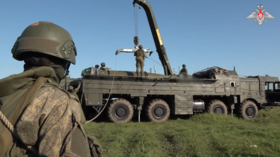NATO state planning ‘long term’ military deployment on Russian ally’s border
Poland is concerned about a “hybrid war” with Belarus, Warsaw’s top general has said
Polish troops deployed along the border with Belarus will be better equipped and stay for the foreseeable future, General Wieslaw Kukula, chief of the Polish Army’s General Staff, has said.
Warsaw sent thousands of regular army soldiers to reinforce the Border Guard last summer, citing the alleged presence of ‘Wagner Group’ personnel in Belarus and accusing Moscow and Minsk of waging a “hybrid war.”
“Sending soldiers with firearms to support the Border Guard is a strong signal,” Kukula said at a press conference in Warsaw on Tuesday. “Today, the nature of the hybrid conflict is clearly visible at the border. It is a constant race between tactics and applied techniques.”
Poland has claimed that the influx of migrants from Africa and Asia via Belarus is part of a plot by Russia and Belarus to destabilize the EU and NATO member state.
“Migratory pressure will be maintained. This is the goal of Belarus, this is the goal of the Russian Federation,” Kukula claimed. “We have intelligence that confirms that this pressure will be maintained. We assume long-term deployment of the Armed Forces as support for the Border Guard. We will not give up.”
Moreover, Kukula argued that the troops along the border need to be fully armed, because “a situation may arise when firearms will be used against us.” However, he said, Poland is maintaining “far-reaching restraint” so as not to give Belarus or Russia a pretext to escalate.
Poland has served as NATO’s primary conduit for weapons, ammunition and equipment deliveries to Ukraine, while maintaining it wasn’t actually a party to Kiev’s conflict with Moscow.
Last December’s change in government, as the previously ruling Law and Justice (PiS) party narrowly lost out to the Civic Platform-led coalition, did little to change Warsaw’s foreign policy stance.
President Andrzej Duda’s comments about Poland hosting US nuclear weapons did trigger criticism from Prime Minister Donald Tusk in April. While not opposed to the “nuclear sharing” agreement with Washington, Tusk suggested that he had been kept out of the loop on the matter.
Russia has responded to Polish nuclear chatter by warning Warsaw its facilities would be “legitimate targets in case of a direct military conflict” with NATO.






Comments are closed.